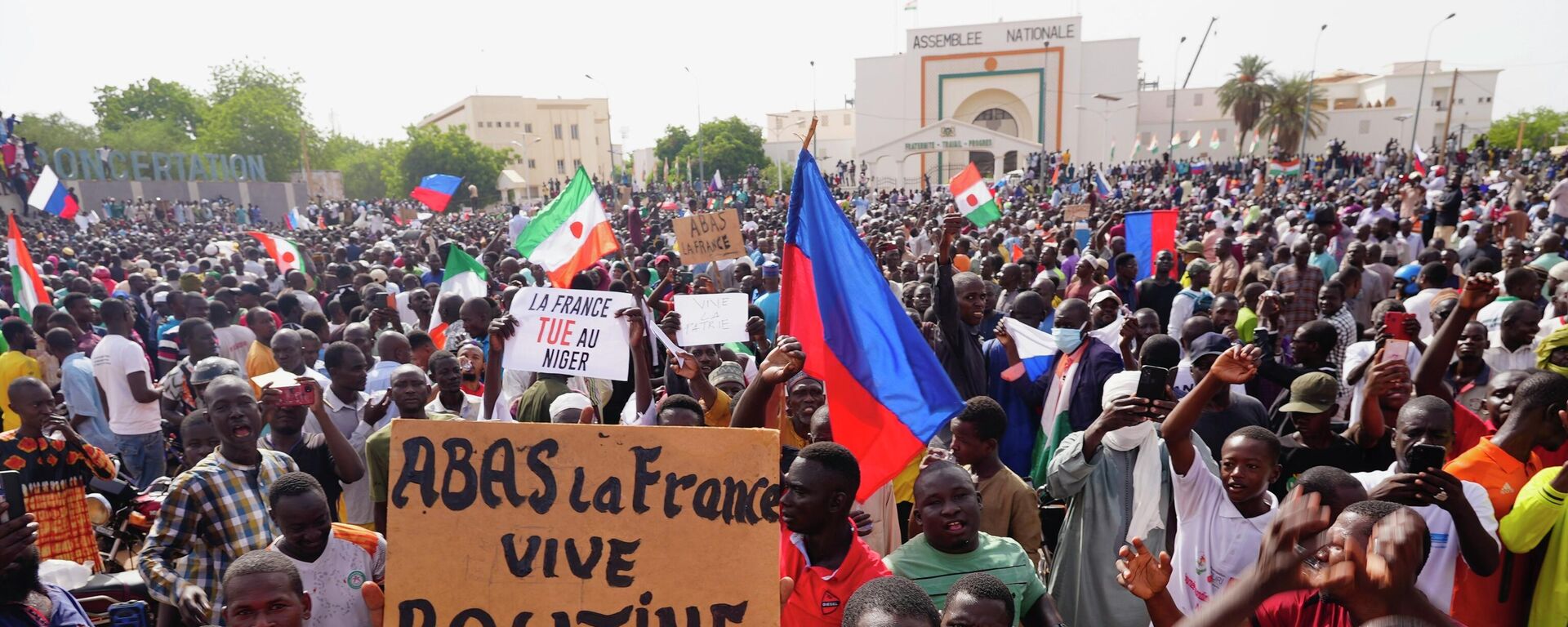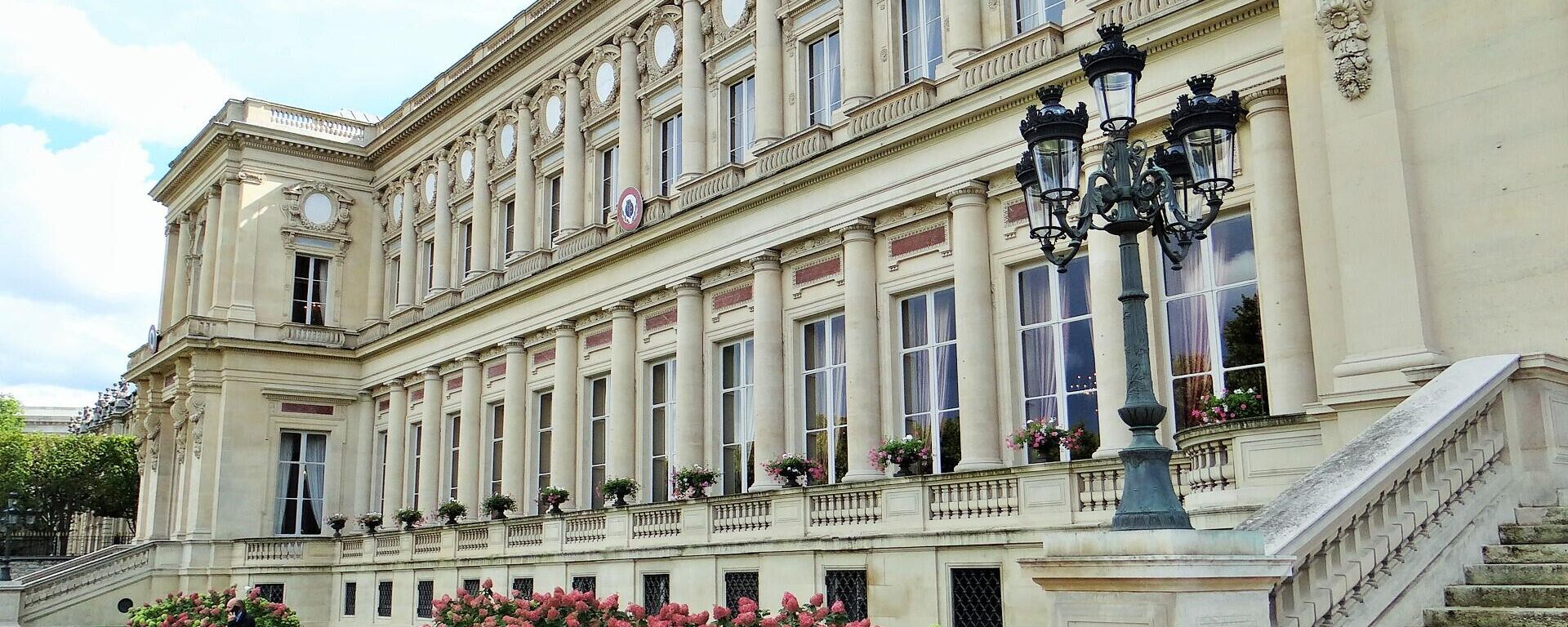https://en.sputniknews.africa/20230808/end-of-francafrique-french-senators-point-to-paris-consecutive-failures-in-africa-1061152891.html
End of Francafrique? French Senators Point to Paris' Consecutive Failures in Africa
End of Francafrique? French Senators Point to Paris' Consecutive Failures in Africa
Sputnik Africa
Despite the desire to change France's image in Africa that President Emmanuel Macron has expressed since his election, the French leader has suffered... 08.08.2023, Sputnik Africa
2023-08-08T13:19+0200
2023-08-08T13:19+0200
2023-08-08T14:42+0200
sub-saharan africa
west africa
niger
mali
burkina faso
central african republic
france
emmanuel macron
military coup
military
https://cdn1.img.sputniknews.africa/img/07e7/08/08/1061154982_0:160:3072:1888_1920x0_80_0_0_37d528f8fbf9effb6d5b357ea99bc1f6.jpg
A group of senators sent an open letter to French President Macron, signed by 94 parliamentarians from different political parties, highlighting France's diplomatic failures in Africa and calling for a review of the country's policies on the continent.According to the parliamentarians, after the failure of Operation Barkhane, the wave of anti-Frech sentiment swept many West African countries, where leaders are "maintaining power by uniting their populations against the former colonial power." In addition to failures in West African nations, they also pointed to "disappointments" in the northern part of the continent. In particular, they mentioned Algerian President Abdelmadjid Tebboune, noting that he tends to "blow hot and cold," sometimes speaking of rapprochement with France and sometimes "of the French 'Great Satan' responsible for all evils."At the same time, in Tunisia, they further elaborated, President Kais Saied turns alternately to the United States, the European Union, the Arab world, and "less to France, which no longer has a privileged role."Emphasizing that they are not nostalgic for colonial times and "do not dream of a French West Africa or a French Equatorial Africa," the parliamentarians expressed their disappointment with the evolution of French policy in Africa in the military sphere, as well as in development cooperation and culture.The senators stressed that it is time to review France's vision of Africa and its relations with the continent, noting that they want the country to maintain strong and friendly ties with Africa in various areas of mutual interest.The parliamentarians' call comes amid recent political developments in Niger, where President Mohamed Bazoum was overthrown by his own elite guard, whose commander, Abdourahmane Tchiani, was named the country's new leader.On July 29, three days after the military came to power in Niger, Paris suspended all development and budgetary aid to the country. On August 3, the Nigerien leadership announced on state television it was terminating the military agreements and protocols signed with its former colonial ruler, France, which had exercised colonial rule over the country for over 60 years.Earlier, supporters of the coup took to the streets, protesting against France and the Economic Community of West African States (ECOWAS). The latter threatened the country's new leadership with military action, urging them to reinstate the ousted president. Following the events in Niger, the military governments of neighboring Mali and Burkina Faso warned that any military intervention against the country would be considered a declaration of war against them. On Monday, they sent a delegation to Niger, to demonstrate their solidarity with its military leaders.After the meeting, the head of the delegation, Mali's Minister of Territorial Administration and Decentralization Abdoulaye Maiga, underlined the decision of his country and Burkina Faso to "participate fully in self-defense operations" of the Nigerien forces in the event of an intervention.In recent years, France has been steadily losing influence in a number of the Sahel countries, including Burkina Faso and Mali, both of which are ruled by military regimes that have seized power in the past two years.Relations between France and Burkina Faso have been on the decline since Captain Ibrahim Traore took power in September 2022. In January this year, Burkina Faso decided to end a military agreement that allowed French troops to fight terrorists on its territory, stating that the country wanted to defend itself.Last year, French troops withdrew from neighboring Mali, ending a decade-long fight against insurgents after relations between the two countries soured.
https://en.sputniknews.africa/20230805/crisis-in-niger-how-frances-interests-in-west-africa-are-at-stake-1061098881.html
https://en.sputniknews.africa/20230805/french-foreign-minister-rules-out-frances-military-intervention-in-niger-1061101417.html
west africa
niger
mali
burkina faso
central african republic
france
cote d'ivoire (ivory coast)
senegal
Sputnik Africa
feedback@sputniknews.com
+74956456601
MIA „Rossiya Segodnya“
2023
News
en_EN
Sputnik Africa
feedback@sputniknews.com
+74956456601
MIA „Rossiya Segodnya“
Sputnik Africa
feedback@sputniknews.com
+74956456601
MIA „Rossiya Segodnya“
west africa, niger, mali, burkina faso, central african republic, france, emmanuel macron, military coup, military, cote d'ivoire (ivory coast), senegal, colonialism
west africa, niger, mali, burkina faso, central african republic, france, emmanuel macron, military coup, military, cote d'ivoire (ivory coast), senegal, colonialism
End of Francafrique? French Senators Point to Paris' Consecutive Failures in Africa
13:19 08.08.2023 (Updated: 14:42 08.08.2023) Despite the desire to change France's image in Africa that President Emmanuel Macron has expressed since his election, the French leader has suffered diplomatic setbacks. After three coups d'état in the region, the military takeover in Niger is seen as a further illustration of the deterioration of relations between Paris and West African states.
A group of senators sent an open letter to French President Macron, signed by 94 parliamentarians from different political parties, highlighting France's diplomatic failures in Africa and calling for a review of the country's policies on the continent.
"Today Niger, yesterday Mali, the Central African Republic, Burkina Faso have rejected France, French forces, French companies [...].This movement in sub-Saharan Africa is spreading with demonstrations and anti-French acts even in countries known to be close to us, such as Cote d'Ivoire or Senegal," the senators said in the letter as cited by local media.
According to the parliamentarians, after the failure of Operation Barkhane, the wave of
anti-Frech sentiment swept many West African countries, where leaders are "maintaining power by uniting their populations against the former colonial power."
In addition to failures in West African nations, they also pointed to "disappointments" in the northern part of the continent. In particular, they mentioned Algerian President Abdelmadjid Tebboune, noting that he tends to "blow hot and cold," sometimes speaking of rapprochement with France and sometimes "of the French 'Great Satan' responsible for all evils."
At the same time, in Tunisia, they further elaborated, President Kais Saied turns alternately to the United States, the European Union, the Arab world, and "less to France, which no longer has a privileged role."
"Today, the Francafrique of yesterday has been replaced by the military Russafrique, the economic Chinafrique or the diplomatic Americafrique. And what about the unfortunate regression of the Francophonie in relation to the English language?" read the letter.
Emphasizing that they are not nostalgic for colonial times and "do not dream of a
French West Africa or a French Equatorial Africa," the parliamentarians expressed their disappointment with the evolution of French policy in Africa in the military sphere, as well as in development cooperation and culture.
The senators stressed that it is time to review France's vision of Africa and its relations with the continent, noting that they want the country to maintain strong and friendly ties with Africa in various areas of mutual interest.
"It is probably time, when Africa, a friendly continent, no longer seems to understand France, and is increasingly contesting its role and its presence," the senators said, adding: "For our part, we are not resigned to our gradual disappearance from the entire continent."
The parliamentarians' call comes amid recent political
developments in Niger, where President Mohamed Bazoum was overthrown by his own elite guard, whose commander, Abdourahmane Tchiani, was named the country's new leader.
On July 29, three days after the military came to power in Niger, Paris suspended all development and budgetary aid to the country. On August 3, the Nigerien leadership announced on state television it was terminating the military agreements and protocols signed with its former colonial ruler, France, which had exercised
colonial rule over the country for over 60 years.
Earlier, supporters of the coup took to the streets, protesting against France and the Economic Community of West African States (ECOWAS). The latter threatened the country's new leadership with military action, urging them to reinstate the ousted president.
Following the events in Niger, the military governments of neighboring Mali and Burkina Faso warned that any military intervention against the country would be considered a
declaration of war against them. On Monday, they sent a delegation to Niger, to demonstrate their solidarity with its military leaders.
After the meeting, the head of the delegation, Mali's Minister of Territorial Administration and Decentralization Abdoulaye Maiga, underlined the decision of his country and Burkina Faso to "participate fully in self-defense operations" of the Nigerien forces in the event of an intervention.
In recent years, France has been steadily losing influence in a number of the Sahel countries, including Burkina Faso and Mali, both of which are ruled by military regimes that have seized power in the past two years.
Relations between France and
Burkina Faso have been on the decline since Captain Ibrahim Traore took power in September 2022. In January this year, Burkina Faso decided to end a military agreement that allowed French troops to fight terrorists on its territory, stating that the country wanted to defend itself.
Last year, French troops withdrew from neighboring Mali, ending a decade-long fight against insurgents after relations between the two countries soured.



